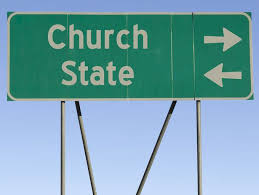“I contemplate with sovereign reverence that act of the whole American people which declared that their legislature should ‘make no law respecting an establishment of religion, or prohibiting the free exercise thereof,’ thus building a wall of separation between Church and State.”
Thomas Jefferson
Court is in session! This week marks the half-way point on our journey through the Top Ten Supreme Court cases of this year. The Trinity Lutheran Church of Columbia v. Pauley case revolves around the idea of the separation of church and state, especially in regards to government funds and aid.
The debate over the separation of church and state is almost as old as the church and the creation of the first state. The timeless conversation is about where to draw the line between the two powers and whether or not they can ever be completely separate and equal.
The Trinity Lutheran Church of Columbia operates a licensed daycare, The Learning Center, which began as a nonprofit and then merged with the Trinity Organization in 1985. Since then, The Learning Center has operated under Trinity and thus incorporated religious lessons into its programs. As expected, The Learning Center maintains a playground for its students and felt it necessary to resurface the playground. In the state of Missouri, where The Learning Center is located, the Department of Natural Resources offers scrap tire material grants to organizations that qualify under state and federal law. The Learning Center applied for one of these grants, but was denied based on an Article within the Missouri Constitution that states “no money shall ever be taken from the public treasury, directly or indirectly, in aid of any church, section, or denomination of religion.”
Trinity sued on behalf of The Learning Center claiming that the state constitution violated the Center’s First and Fourteenth amendment rights, specifically the freedom to express one’s religion and speech and the right to equal protection under the law. The district court dismissed the case and the Trinity Organization amended its complaint so as to state that other religious organizations had been previously granted state funds and that they should receive equal funds as well. All higher level courts affirmed the district court’s opinion, but the Supreme Court has allowed that this case be presented before it.
The constitutional question that is presented by this case is… “does the exclusion of churches from an otherwise neutral and secular aid program violate the First Amendment’s guarantee of free exercise of religion and the Fourteenth Amendment’s equal protection clause?”
This case seems to present a relatively straightforward problem and one that does not express a very large “grey area” of interpretation. The separation of church and state has been a long standing rule, guideline, law, etc. in our nation’s history. Regardless of the fact that other religiously affiliated organizations might have received some form of state and federal aid, there does not appear to be a clear reason why Trinity and The Learning Center should receive any of this aid, if we are simply following the law. However, this case poses the question of whether it is better to completely cut off aid to religiously affiliated organizations, or rather should aid be given to all and any that require it, for then is the state and government truly endorsing one religion over the other?
Links:
https://www.oyez.org/cases/2016/15-577


